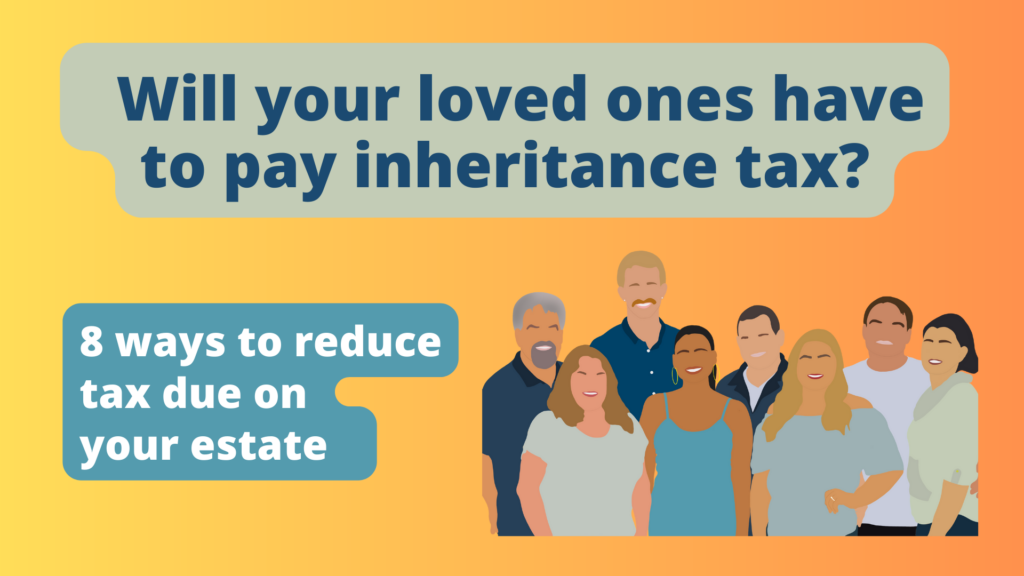Inheritance Tax is increasingly important to our clients, led by the rapid rise in property prices over recent decades and the fact that the inheritance tax threshold has remained static since 2009.

How much is inheritance tax and will it apply to my estate?
Each individual in the UK qualifies for a Nil Rate Band of £325,000, which means that there’s no tax to pay on the first £325K within your estate. That threshold will remain the same until at least 2028, which means that every year more people will be exposed to inheritance tax at 40% on the wealth they leave behind.
But that doesn’t mean your estate will be liable. There are a number of allowances, reliefs and strategies to help you avoid or minimise that tax bill, so that more of your hard-earned assets stay in the family. Here are 8 ways to reduce your exposure…
1. Understand the allowances:
In addition to the £325,000 Nil Rate Band, there’s a further allowance for those who own their own home of up to £175,000.
To qualify, the person who died must have left their home, or a share of it, to their direct descendants – their children, stepchildren, adopted children or grandchildren.
This way, a homeowner’s estate could total up to £500,000 before inheritance tax applies.
2. Benefits for couples
For married couples and civil partners, there’s a useful tax perk. Spouses can inherit each other’s estate without incurring inheritance tax.
Furthermore, any unused tax-free allowance from the first partner’s estate can be transferred to the surviving partner, potentially doubling the tax-free threshold up to as much as £1 million.
3. Strategic gifting:
Why wait for the future to start distributing your wealth, when you can start making strategic gifts now? Small gifts made during your lifetime are often exempt from inheritance tax. Use the annual gift exemption limit to gradually transfer assets to your beneficiaries while minimising your potential tax liabilities.
4. Explore trust options:
Trusts can be powerful tools for managing inheritance tax. By placing assets into irrevocable trusts, you can potentially remove them from your estate, thus reducing the taxable amount. Trusts require careful consideration and planning, so seek financial and tax advice before making any decisions.
5. Embrace business relief:
If you own a family business, business relief can be a crucial tool in tax planning. This relief can provide up to 100% exemption from inheritance tax on qualifying business assets. By keeping the business operational, you can not only protect your legacy but also benefit from significant tax savings.
6. Make charitable contributions:
If you have charitable inclinations, consider incorporating them into your estate plan. Leaving a portion of your assets to registered UK charities in your will can lead to a reduced inheritance tax rate – from 40% to 36%. This way, you can support causes you care about while potentially benefiting your loved ones financially.
7. Downsize thoughtfully:
If your current property is larger than your needs, downsizing could help. Selling a larger property and moving into a more suitable one could qualify you for downsizing relief, lowering your inheritance tax liability based on the property’s value.
8. Consider life insurance:
Placing life insurance policies in trust can ensure that the payout is excluded from your estate for tax purposes. A whole of life policy will pay out on your death at any age, passing money on to your loved ones. This way, the insurance proceeds can directly benefit your beneficiaries without being subject to inheritance tax.
While inheritance tax might seem daunting, employing these strategies can help you navigate it effectively. Every financial situation is unique, so always consult a knowledgeable financial or tax advisor before implementing any of these approaches.
But proactive planning, exploring your options and making informed decisions could safeguard your family’s financial future and pass on your legacy intact.
To discuss your own inheritance tax liability and how to mitigate it, get in touch with us today. As local tax specialists we can give you advice and support to protect your family’s future.

